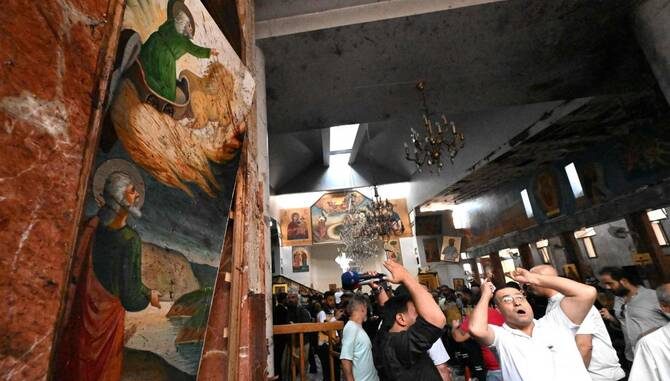
People and rescuers inspect the damage at the site of a reported suicide attack at the Saint Elias church in Damascus’ Dwelaa area on June 22, 2025. (AFP)
| Published June 23, 2025
A wave of violence and rising regional tensions has gripped the Middle East once again, as a deadly suicide bombing rocked a church in Damascus and Israel–Iran hostilities intensified. Turkish President Recep Tayyip Erdogan vowed to help prevent Syria from descending back into chaos, while Syrian authorities announced arrests tied to the attack. Meanwhile, international attention turned to the humanitarian fallout, with the European Commission stepping in to support Palestinians amid escalating unrest. These developments underscore the fragile balance of power and the urgent need for coordinated diplomacy to avert further regional destabilization.
🕊️ 1. Erdogan vows to prevent Syria relapsing into chaos
Turkish President Recep Tayyip Erdogan responded to a suicide bombing at Saint Elias Church in Damascus on June 22, 2025, which killed 22 (some reports say up to 25). Erdogan stated that Türkiye will not allow extremist groups to drag Syria back into instability and pledged support for the new Syrian authorities tackling such threats.
 2. Arrests made in Damascus terror attack
2. Arrests made in Damascus terror attack
Syrian Interior Minister Anas Khattab announced several arrests linked to the church attack, claiming the operation targeted Daesh-affiliated cells. Authorities affirmed their commitment to bringing all perpetrators to justice. This was the first suicide bombing of a church in Damascus since the 2011 conflict.
🔍 3. Regional escalation – Iran‑Israel conflict
-
Israeli strikes on Iran have reportedly killed at least 950 people, wounding 3,450, according to the Human Rights Activists group (with around 380 civilian fatalities).
-
In response, Iran launched missile barrages—air raid sirens sounded over Israel as the situation enters its 11th day.
-
Senior Islamic and Arab leaders—including Oman’s Sultan Haitham and Jordan’s King Abdullah II—have urged dialogue to de-escalate tensions ∙highlighting a two‑state solution for Palestine as a path to broader regional stability.
 4. EU support for Palestinians
4. EU support for Palestinians
The European Commission announced a €150 million ($172 m) aid package to support essential public services in the Palestinian territories and €52 million ($58 m) for UNRWA’s work—education, healthcare, and humanitarian relief across Gaza, the West Bank, Jordan, Lebanon, and Syria. This is part of a larger €1.6 billion recovery package for 2025–26
 Strategic Prospects vs. Security Concerns
Strategic Prospects vs. Security Concerns
-
Turkey’s Strategic Engagement in Syria
-
President Erdogan’s vow to support Syria’s stability serves dual purposes: curbing extremist threats and reinforcing Türkiye’s regional influence.
-
Türkiye positions itself as a stabilizing force while expanding its geopolitical footprint in post-conflict zones.
-
-
Iran–Israel Escalation and Security Fallout
-
Israel’s airstrikes on Iranian targets are intended to weaken Tehran’s military capabilities but risk triggering wider regional conflict.
-
Iran’s missile response asserts strength, yet raises fears of entrenching a prolonged and destabilizing confrontation.
-
-
European Union’s Humanitarian Strategy
-
The EU’s €230 million aid package aims to stabilize the Palestinian territories through education, healthcare, and basic services.
-
This support helps mitigate potential refugee flows and discourages extremist recruitment, serving both humanitarian and strategic interests.
-
-
Gulf States’ Call for De-escalation
-
Leaders from Jordan, Oman, and other Arab nations are advocating for diplomacy, emphasizing a two-state solution for Palestine as a path to lasting peace.
-
These calls reflect both a desire to reduce conflict spillover and a strategic effort to preserve regional economic stability.
-
 Bottom Line:
Bottom Line:
The Middle East remains at a delicate crossroads where strategic ambitions and security concerns are tightly intertwined. While regional actors like Turkey and Iran pursue influence through military and political channels, the costs of instability continue to mount—especially for civilians caught in the crossfire. The EU’s aid efforts and diplomatic appeals from Arab leaders suggest a growing international consensus on the need for restraint and reconstruction. Yet without concrete steps toward sustainable peace, the region risks sliding further into cycles of retaliation and unrest. Long-term stability will depend on balancing power dynamics with inclusive, humanitarian-focused strategies.
SOURCES: ARAB NEWS – Erdogan says won’t let terror ‘drag Syria back to instability’





Be the first to comment